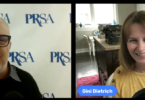Each September, PRSA recognizes Public Relations Ethics Month, supported by programs presented by the PRSA Board of Ethics and Professional Standards (BEPS). This year’s theme, Public Relations Ethics: Strengthening Our Core, guides a special focus on the six core values highlighted in the PRSA Code of Ethics. Please join the discussion through blog posts, webinars and Twitter Chats (#PREthics) scheduled throughout the month of September and consider the content a catalyst for integrating ethics and ethical practice into your daily communication activities.
The PRSA Code of Ethics defines the value of loyalty in this way: We are faithful to those we represent, while honoring our obligation to serve the public interest.
Who — or what — deserves your loyalty? While loyalty seemed more like a scouting motto than a business practice, I signed the Code of Ethics that includes it when I joined PRSA. While many of the provisions of the code were not new to me, I learned through trial and both error and success how deeply those six stated values would impact my life as a PR professional.
Of course, I felt loyal to my first employer, a PR and MARCOM agency. I was so happy to have the opportunity to learn public relations from an amazing mentor there. But honestly, I had really never thought about how my loyalty would be tested. Here are some of my seminal experiences along the way to today, and why I consider loyalty an important and appropriate part of the Code.
Loyal to a colleague — or honesty?
My first test came early. In my very first year, a colleague asked me to call and tell someone a lie on behalf of a client of the firm. I thought about it, and with some fear and hesitation, just said no. I found myself called in front of the president to explain what had happened and my actions. I realized then that being loyal to myself and my values could cost my job. Fortunately it didn’t. Years later I was appointed a vice president of that company by the same president.
Loyal to the public interest — or the client?
While I have not had many run-ins with the public interest, I had one interesting one with the law. A client wanted us to do something I considered a clear violation of a Securities and Exchange Commission regulation. I said no and asked my boss to weigh in on that decision. He allowed me to consult our corporate attorney, who agreed with the decision. In this case, we did lose the client, who refused to accept our counsel.
Loyal to the client — or the news media?
A client insulted a very influential editor while we were working together on a major story. I sent flowers to apologize for the behavior. When the client scolded me in a meeting, I told him that the editor’s goodwill, which we had spent years earning, was more important than the client’s retainer. Risky behavior financially, but true and required. In this case, we kept the client, who learned something about ethics.
Loyal to my employer — or my client?
This last example broke my heart. An agency where I had worked for many years wanted to do business with a company that was very close to being a competitor to one of our longtime clients. I was asked to discuss it with our client, who said they definitely would consider that action a conflict of interest. So my boss agreed that we would not proceed, and I told our client we would respect his opinion. When I learned that my company did not keep their word, it was a deal breaker for me. I don’t believe you can continue to work at a senior level — or any level — for a company that will lie to you.
When I began my career in public relations, I had just graduated from college and had no deep understanding of what public relations was really all about. I am grateful to have become a member of PRSA, and most recently also the PRSA Board of Ethics and Professional Standards (BEPS). I am convinced that what I have learned through these associations and practicing the code has strengthened my professionalism and given me success over more than 35 years in my PR career.
So here’s what I have learned about loyalty. Sometimes loyalties collide. As a PR professional, you have to become an expert at creating consensus to move forward. Or you have to face the consequences of choosing who or what deserves your overriding loyalty. If you don’t expect to be faced with ethical decisions or called upon for ethical counsel as part of your PR job, I earnestly suggest that you reconsider that point of view. Knowing and practicing the Code — or not — is one of the most important decisions of your career.
Bobbi J. Simmons, APR, is PR director at Arlington/Roe, headquartered in Indianapolis. She has been a PRSA member since 1986. Two of her favorite PRSA volunteer positions have been member of the PRSA Board of Ethics and Professional Standards (BEPS), which she now serves ex officio, and past president of the PRSA Hoosier Chapter. Connect with her on LinkedIn.








I think it’s easy to get caught up in the hustle and bustle of it all and forget the value of loyalty. This article does a great job of explaining the importance of keeping colleagues, clients and employers happy, but doing so, by staying loyal to the PRSA Code of Ethics.
Great piece, Bobbi. When I talk about this topic to young professionals, it’s often news to them that our Code says we are to serve the public trust – the greater good – which can often mean counseling a client NOT to do something they really want to do and/or leaving if they don’t. I have experienced some of those same heartbreaks. I appreciate your sharing yours.